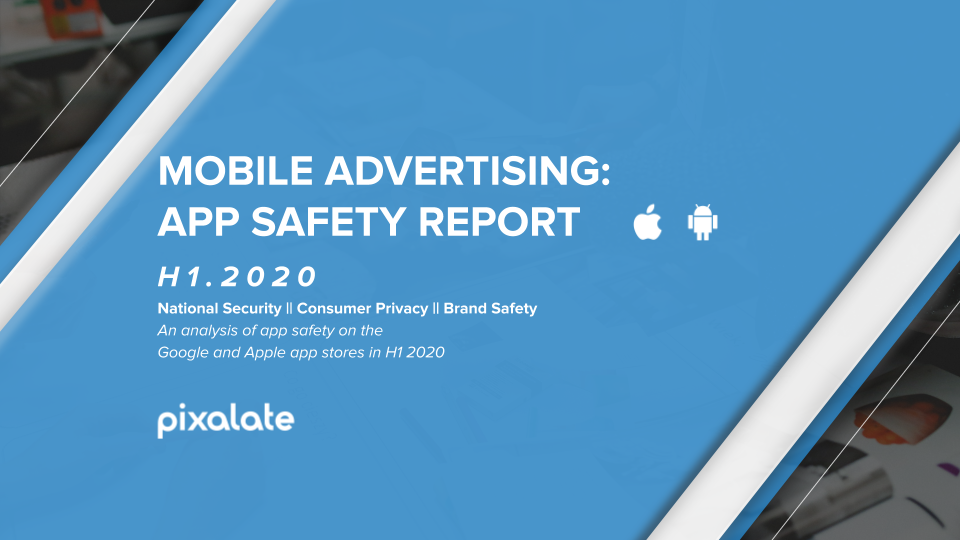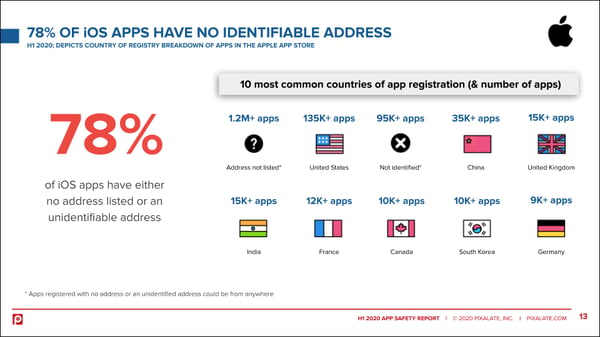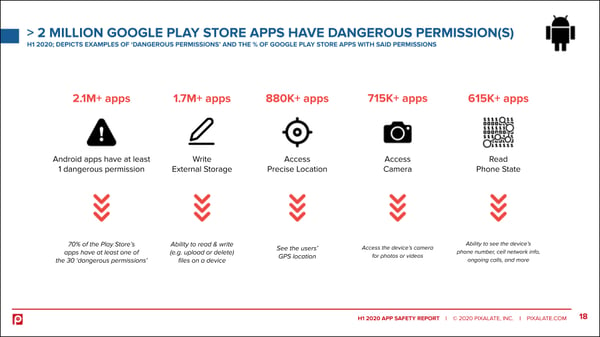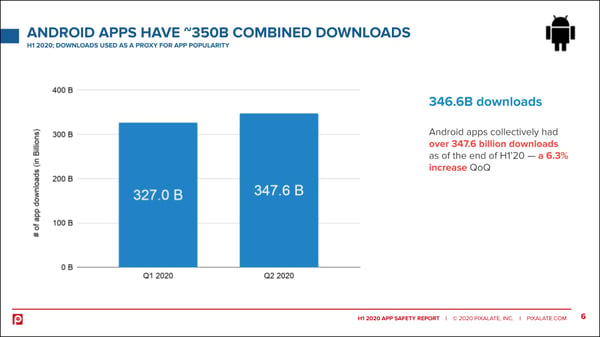
Pixalate's study of 4.7M+ apps shines a light on consumer privacy risk factors across the top mobile app stores
As the mobile app world continues to grow, with over 4.7 million combined apps in the Google Play Store and Apple App Store, apps are gaining access to more and more consumer data. But not enough is known about where the apps are registered — and where the consumer data they collect is stored and processed.
Today, Pixalate, a global ad fraud intelligence and marketing compliance company, released its H1 2020 Mobile Advertising: App Safety Report, a deep dive into the state of mobile apps today.
Pixalate’s report looks at app popularity, consumer privacy dangers, app country of registry (or lack thereof) and more.


Among the most common dangerous permissions are:
Apps keep growing in popularity

The report also breaks down:
Download a free copy of the H1 2020 Mobile Advertising App Safety report today.
Follow Pixalate
###
About Pixalate
Pixalate is a global ad fraud intelligence and marketing compliance platform that works with brands and platforms to prevent invalid traffic and improve ad inventory quality. We offer the only system of coordinated solutions across display, app, video, and OTT/CTV for better detection and elimination of ad fraud.
Pixalate is an MRC-accredited service for the detection and filtration of sophisticated invalid traffic (SIVT) across desktop and mobile web, mobile in-app, and OTT/CTV advertising. www.pixalate.com
Disclaimer
The content of this press release, and the H1 2020 Mobile Advertising: App Safety Report (the "Report"), reflect Pixalate's opinions with respect to the factors that Pixalate believes can be useful to the digital media industry. Any proprietary data shared is grounded in Pixalate's proprietary technology and analytics, which Pixalate is continuously evaluating and updating. As cited in the Report and referenced in the Report's key findings reproduced herein, programmatic ad transactions, as measured by Pixalate, are used as a proxy for ad spend. The Report examines U.S. advertising activity. Any references to outside sources in the Report and herein should not be construed as endorsements. Pixalate's opinions are just that, opinions, which means that they are neither facts nor guarantees.
It is important to also note that the mere fact that, for example, an app receives “dangerous permissions” (as defined by Google), appears to be transmitting personal data from the E.U. to countries that have not yet been identified by the European Commission as having adequate privacy safeguards, or is registered in a traditional tax haven country or a country that appears to be receiving heightened scrutiny by U.S. or E.U. governmental bodies does not necessarily mean that such app, or its publisher, is actually exploiting data subjects. Instead, Pixalate is merely rendering an opinion that such facts may be suggestive of heightened risks to data subjects. Pixalate is sharing this data not to impugn the standing or reputation of any entity, person or app, but, instead, to report facts as they pertain to delisted Android and iOS apps.
*By entering your email address and clicking Subscribe, you are agreeing to our Terms of Use and Privacy Policy.
These Stories on Mobile
*By entering your email address and clicking Subscribe, you are agreeing to our Terms of Use and Privacy Policy.

Disclaimer: The content of this page reflects Pixalate’s opinions with respect to the factors that Pixalate believes can be useful to the digital media industry. Any proprietary data shared is grounded in Pixalate’s proprietary technology and analytics, which Pixalate is continuously evaluating and updating. Any references to outside sources should not be construed as endorsements. Pixalate’s opinions are just that - opinion, not facts or guarantees.
Per the MRC, “'Fraud' is not intended to represent fraud as defined in various laws, statutes and ordinances or as conventionally used in U.S. Court or other legal proceedings, but rather a custom definition strictly for advertising measurement purposes. Also per the MRC, “‘Invalid Traffic’ is defined generally as traffic that does not meet certain ad serving quality or completeness criteria, or otherwise does not represent legitimate ad traffic that should be included in measurement counts. Among the reasons why ad traffic may be deemed invalid is it is a result of non-human traffic (spiders, bots, etc.), or activity designed to produce fraudulent traffic.”

